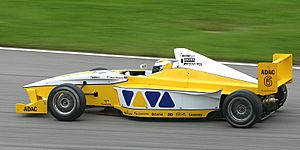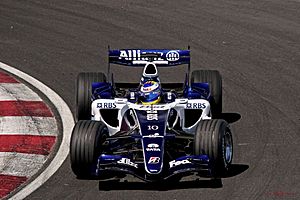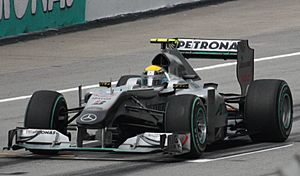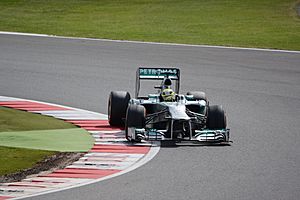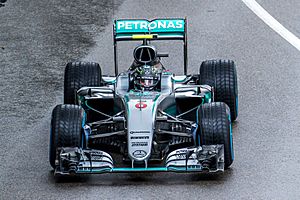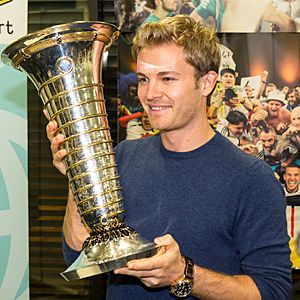Nico Rosberg facts for kids
Quick facts for kids
Nico Rosberg
|
|
|---|---|
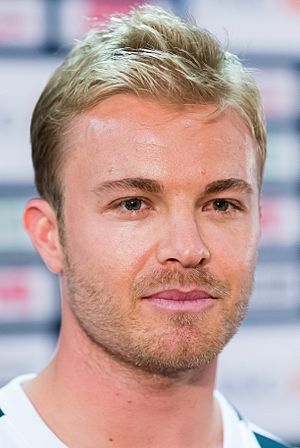
Rosberg in 2016
|
|
| Born |
Nico Erik Rosberg
27 June 1985 |
| Spouse(s) |
Vivian Sibold
(m. 2014) |
| Children | 2 |
| Parent(s) |
|
| Formula One World Championship career | |
| Nationality | |
| Active years | 2006–2016 |
| Teams | Williams, Mercedes |
| Car number | 6 |
| Entries | 206 (206 starts) |
| Championships | 1 (2016) |
| Wins | 23 |
| Podiums | 57 |
| Career points | 1594.5 |
| Pole positions | 30 |
| Fastest laps | 20 |
| First entry | 2006 Bahrain Grand Prix |
| First win | 2012 Chinese Grand Prix |
| Last win | 2016 Japanese Grand Prix |
| Last entry | 2016 Abu Dhabi Grand Prix |
| Signature | |
 |
|
Nico Erik Rosberg (born 27 June 1985) is a former German-Finnish racing driver who won the Formula One World Championship in 2016. He raced in Formula One for 11 seasons, from 2006 to 2016, and won 23 Grands Prix with the Mercedes team.
Nico is the son of the 1982 Formula One World Champion, Keke Rosberg. This makes them the second father-and-son pair to both win the championship, after Graham and Damon Hill. Nico grew up in Monaco and started kart racing when he was just six years old. He was very successful in karting before moving on to car racing.
He joined Formula One in 2006 with the Williams team. In 2010, he moved to the new Mercedes team, where his teammate was the famous seven-time champion Michael Schumacher. From 2013 to 2016, he was teammates with his childhood karting friend, Lewis Hamilton. They had a famous and intense rivalry. In his final season, Nico beat Hamilton to win the 2016 title.
Just five days after becoming champion, Rosberg surprised the world by announcing his retirement from racing. He said he wanted to spend more time with his family. Since retiring, he has become an entrepreneur focused on green technology and a commentator for television.
Personal Life and Early Years
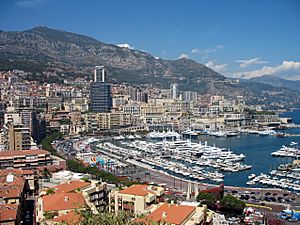
Nico Rosberg was born in Wiesbaden, West Germany. His father, Keke Rosberg, is a famous racing driver from Finland, and his mother, Sina, is from Germany. Because of this, Nico holds citizenship in both countries. He grew up mostly in Monaco and Ibiza, Spain.
Rosberg was a good student and was taught five languages: English, French, German, Italian, and Spanish. He loved studying math and science. He graduated from school in 2002 with excellent grades.
In 2014, he married his longtime girlfriend, Vivian Sibold. They have two daughters. Rosberg is a fan of the Bayern Munich football club and used to compete in triathlon events.
The Road to Formula One
Karting and Junior Racing
Rosberg's love for racing started early. At age four, he drove a go-kart for the first time. He began racing competitively at age six. After watching his dad race, he knew he wanted to become a Formula One driver. His parents supported him as long as he did well in school.
He won many karting championships in France and Europe. In 1999, he and future rival Lewis Hamilton were teammates on a karting team created for them.
At 16, Rosberg moved up to car racing. In 2002, he won the German Formula BMW ADAC Championship. As a reward, he got to test a Formula One car for the first time, becoming the youngest person ever to do so at the time. After success in the Formula 3 Euro Series, he won the first-ever GP2 Series championship in 2005. This victory proved he was ready for Formula One.
Formula One Career
Starting with Williams (2006–2009)
Rosberg made his Formula One debut with the Williams team in 2006. In his very first race in Bahrain, he finished seventh and set the fastest lap. At the time, he was the youngest driver in F1 history to set a fastest lap.
During his first few years, the Williams car was not always reliable or fast enough to compete for wins. However, Rosberg showed his talent and skill. In 2008, he earned his first podium finish by coming in third at the Australian Grand Prix. Later that year, he finished second in Singapore. By 2009, he was consistently scoring points and finished seventh in the World Drivers' Championship.
Moving to Mercedes (2010–2016)
Teaming with Legends
In 2010, Rosberg joined the newly formed Mercedes team. His teammate was the legendary seven-time world champion, Michael Schumacher. Rosberg performed very well, often finishing ahead of Schumacher. He earned three podium finishes in his first season with Mercedes.
In 2012, at the Chinese Grand Prix, Rosberg won his first-ever Formula One race from pole position (starting in first place). It was a huge moment for him and the Mercedes team.
The Hamilton-Rosberg Rivalry
In 2013, Lewis Hamilton, Rosberg's old friend from karting, joined Mercedes. They were now teammates, and a great rivalry began. The Mercedes car was becoming the best on the track, especially with the new turbo-hybrid engines in 2014.
From 2014 to 2016, Rosberg and Hamilton fought for the World Championship. Their battle was intense and sometimes caused tension within the team. In both 2014 and 2015, Rosberg finished as the runner-up to Hamilton. He won many races, including the famous Monaco Grand Prix three times in a row (2013, 2014, 2015).
Becoming a World Champion
The 2016 season was the peak of Rosberg's career. He started the year by winning the first four races. The championship battle with Hamilton was incredibly close and went down to the very last race in Abu Dhabi.
Rosberg needed to finish on the podium to win the title. During the race, Hamilton, who was in the lead, slowed down on purpose to try and let other drivers pass Rosberg. But Rosberg held on to second place and won the World Championship by just five points. He had finally achieved his childhood dream.
A Surprise Retirement
Just five days after winning the championship, Rosberg shocked the sports world by announcing his retirement from Formula One. He explained that he had reached the "pinnacle" of his career and had achieved everything he wanted.
He also said he wanted to spend more time with his wife and young family and did not want the stress of another championship fight. He was the first reigning champion to retire from F1 since 1993.
Life After Racing
Since retiring, Rosberg has become an eco-entrepreneur, investing in companies that work on green technology and electric vehicles. He started the Greentech Festival, an event that shows off sustainable technologies.
He is also a popular figure on YouTube, where he has a vlogging channel. He works as an expert commentator for TV broadcasts of Formula One races. In 2020, he started his own racing team, Rosberg X Racing (RXR), which competes in the all-electric off-road series called Extreme E. His team won the first-ever Extreme E championship in 2021 and won again in 2023.
Images for kids
See also
 In Spanish: Nico Rosberg para niños
In Spanish: Nico Rosberg para niños
 | Percy Lavon Julian |
 | Katherine Johnson |
 | George Washington Carver |
 | Annie Easley |


